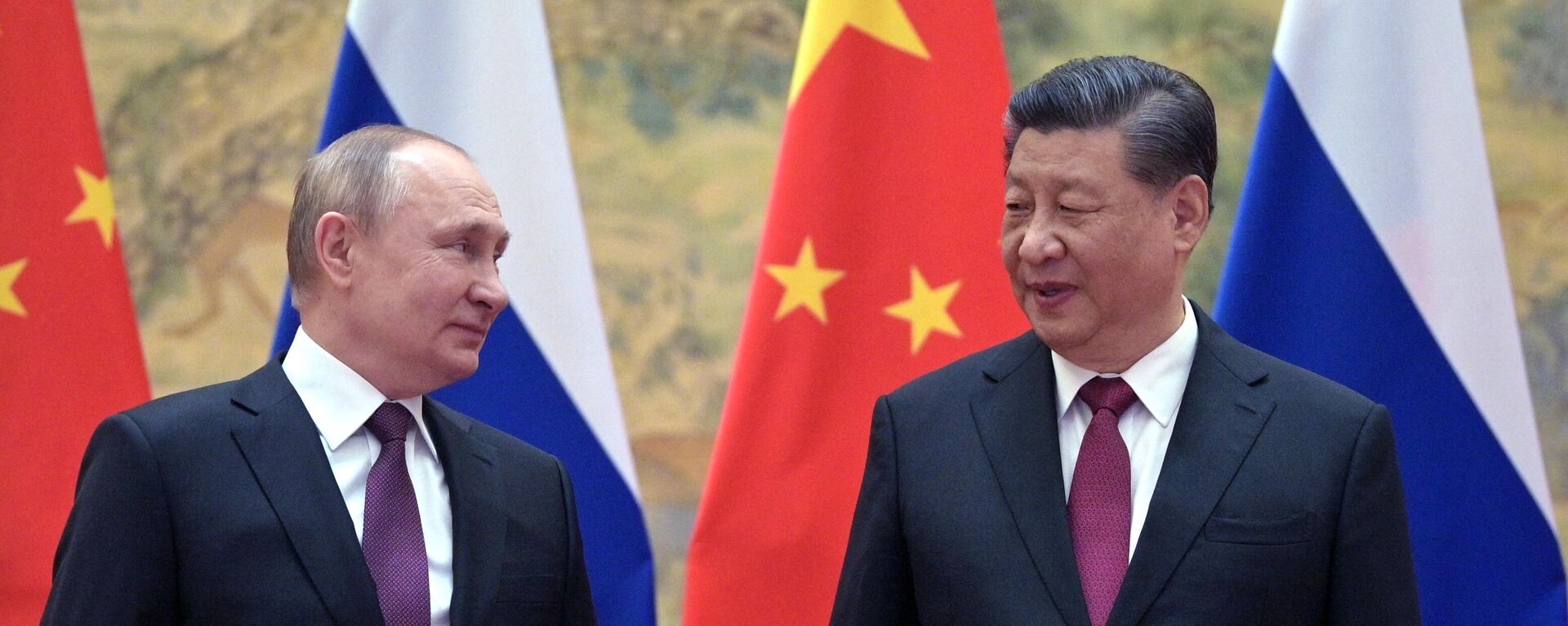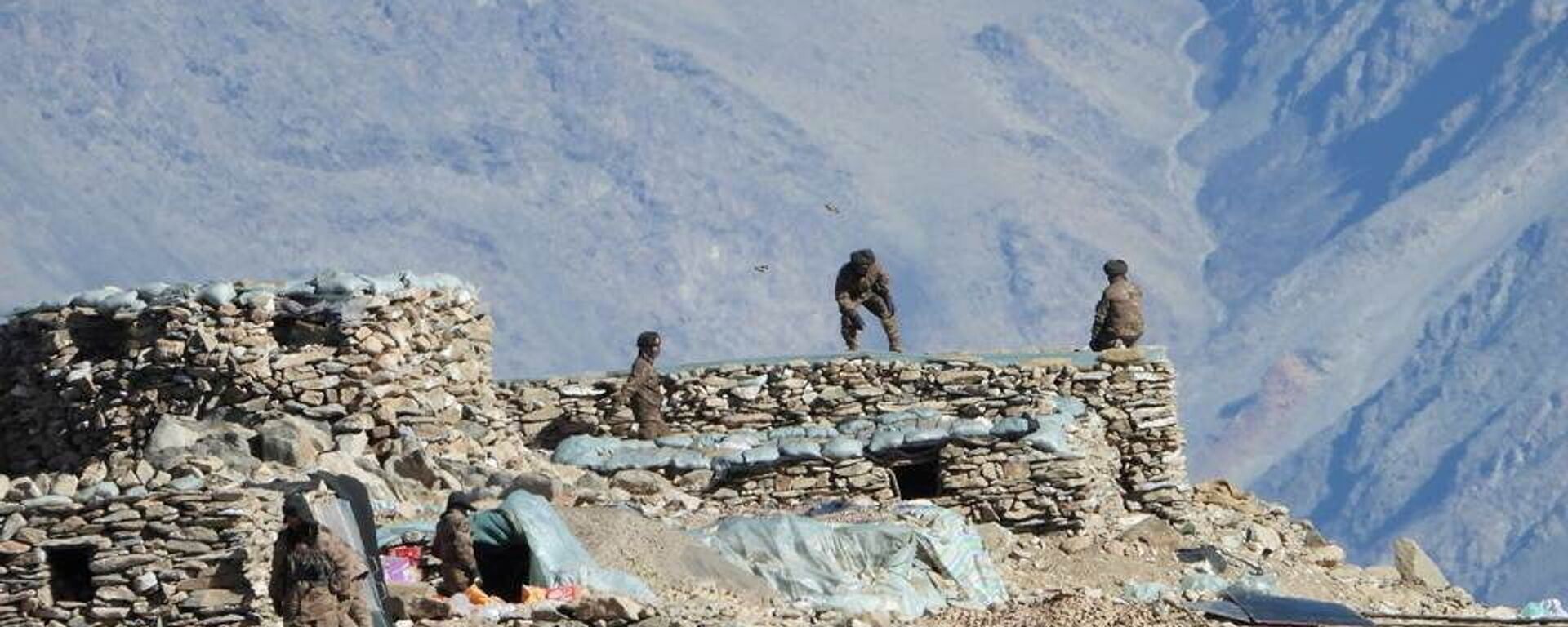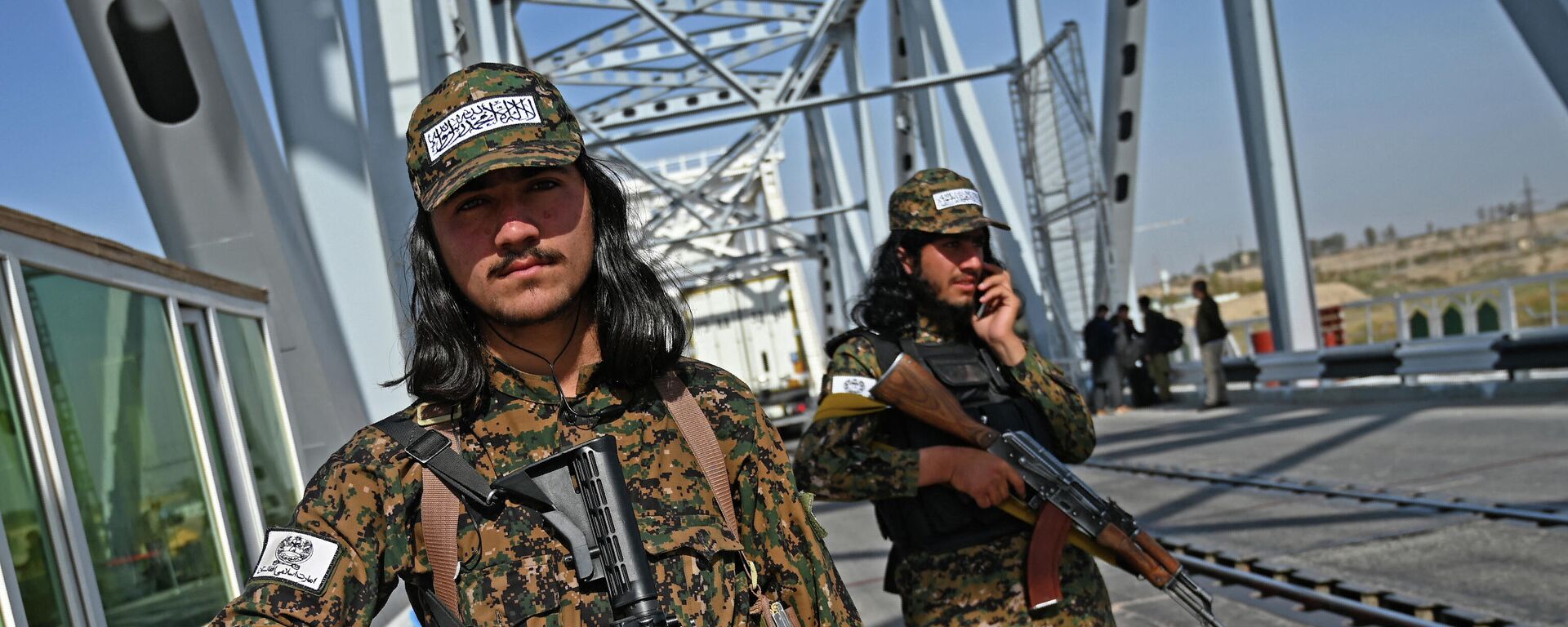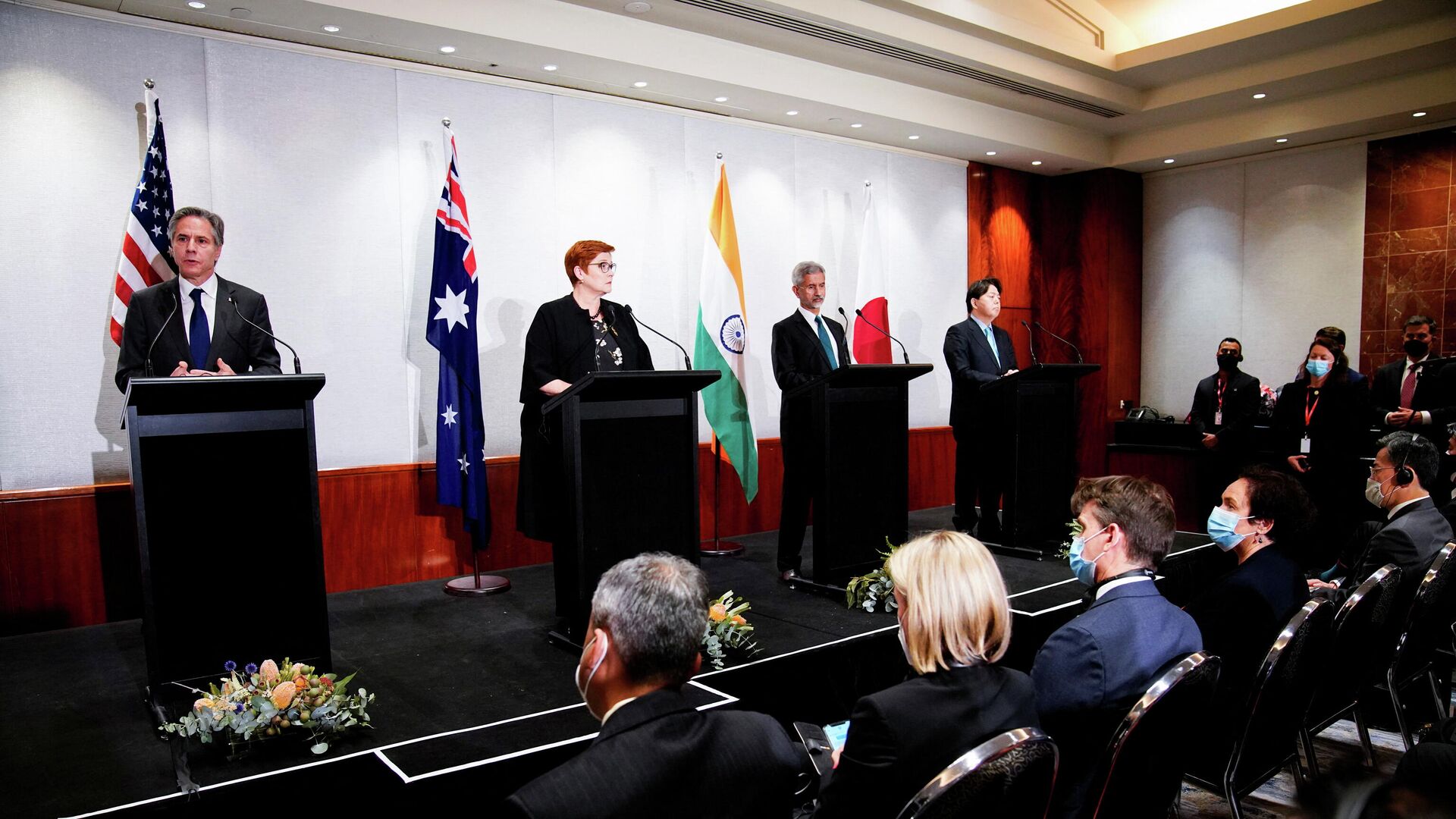https://sputnikglobe.com/20220211/ukraine-crisis-didnt-make-it-to-quads-joint-statement-because-of-india-reckons-australian-expert-1092935505.html
Ukraine Crisis Didn't Make It to Quad's Joint Statement Because of India, Reckons Australian Expert
Ukraine Crisis Didn't Make It to Quad's Joint Statement Because of India, Reckons Australian Expert
Sputnik International
The fourth edition of the Quad foreign ministers’ meeting (FMM) among Australia, India, Japan and the US took place in Melbourne on 11 February. The joint... 11.02.2022, Sputnik International
2022-02-11T13:40+0000
2022-02-11T13:40+0000
2022-10-19T19:37+0000
quadrilateral security dialogue (quad)
china
ukraine
russia
antony blinken
subrahmanyam jaishankar
australia
marise payne
afghanistan
us
https://cdn1.img.sputnikglobe.com/img/07e6/02/0b/1092940667_0:0:3071:1728_1920x0_80_0_0_cade70c65b663fc7419d72a40fec0ac7.jpg
Indian Foreign Minister Subrahmanyam Jaishankar on Friday found himself resisting calls by his counterparts from Australia, Japan and the US to call out Moscow over what they have described as the ongoing "military build-up" at the Russia-Ukraine border.At a joint press conference after the conclusion of the Quad ministerial meeting in Melbourne, US Secretary of State Antony Blinken, Australian Foreign Minister Marise Payne and their Japanese counterpart Yoshimasa Hayashi were all united in expressing their government’s support for Kiev in the dispute in eastern Europe.Blinken even went on to claim in the presence of his Quad counterparts that Moscow could invade Ukraine even during the ongoing Winter Olympics in Beijing, further alleging that additional Russian forces were arriving at the border.The top US diplomat raised the issue at the Quad meeting, a forum catering to the affairs of the Asia-Pacific region.In the lead-up to the meeting, both Blinken and Payne had stated that the Ukraine-Russia border dispute would be on the agenda during the event.The Indian Foreign Minister, on the other hand, stated earlier in the day that the Quad wasn’t the right place to discuss the Ukraine issue.Professor Pradeep Taneja, a senior lecturer in Asian politics at the University of Melbourne and an academic fellow at Australia-India Institute (AII) caught up with Sputnik after the Quad FMM.Excerpts:Sputnik: Do you think that India has pushed back the efforts of Australia, the US and Japan in making the Ukraine-Russia tensions a major agenda item during the fourth Quad Foreign Ministers’ Meeting?Professor Pradeep Taneja: It seems that’s the case… Secretary Blinken was very vocal in expressing his concerns about the ongoing tensions (during the joint press conference after the meeting). The Australian foreign minister has been quite vocal about it too. However, the joint statement makes no mention of the Russia-Ukraine tensions.Sputnik: Is putting the Russia-Ukraine tensions on the Quad’s agenda counter-productive to the original intention of the grouping, which is to present an alternative to China’s development model? Has the focus of the US under President Joe Biden shifted away from the Indo-Pacific region, unlike under his predecessor, Donald Trump?Professor Taneja: I don’t think that’s the case. A major power like the United States has the capability to deal with challenges on multiple fronts. I believe that the US’ diplomacy can take care of issues both across the Atlantic Ocean and in the Indo-Pacific region.In spite of the Ukraine-Russia issue possibly occupying most of the time of the Biden administration, the Quad foreign ministers’ meeting wasn’t postponed. Sputnik: Until now, the Quad primarily has been focused on maritime disputes in the East and South China Seas. How can the Quad help India find a solution to its ongoing border row with China in Ladakh?Professor Taneja: The Quad doesn’t have any role in the India-China border dispute, which has largely remained bilateral in nature until now. But if this partnership continues to grow, it will lead to greater intelligence sharing and increased diplomatic and moral support for India from the other Quad members.Sputnik: What would you say about the trade levels between China and the Quad countries? In spite of domestic calls to boycott Chinese imports, India last year imported goods worth nearly $100 billion from China, the highest ever on record. China is also among the largest trading partners of Australia and the US. Has the idea of de-coupling the global economy from that of China's failed?Professor Taneja: The idea of de-coupling is not a realistic agenda to be pursued, and I don’t think India was ever pursuing it in real terms. What the governments of India, the US, Australia and Japan have been talking about is diversification and creating resilient supply chains.India is clearly very much reliant on Chinese imports of not only consumer goods, but also components, electronics and even pharmaceutics, including Active Pharmaceutical Ingredients (APIs). But what is possible for India and the Quad countries is to diversify their imports.In the case of Australia, it exports the bulk of its raw material to China. But the Australian government is looking for alternatives. For example, when the Indian economy picks up, it could act as a major buyer of Australian raw material.Sputnik: The joint statement also makes a mention of Afghanistan and warns that the country’s territory must not be used to train or shelter terrorists targeting other countries. How do you expect the Quad countries to collaborate in the realm of counter-terrorism, particularly in Afghanistan and south Asia?Professor Taneja: I believe that the Quad countries understand Afghanistan quite well. After all, the US was there for quite a long time. India also has significant (people-to-people) connections and an interest in Afghanistan. The Quad nations are likely to keep discussing Afghanistan in the future as well. Then, there is also another concern about dealing with the Islamic State*. The Taliban, it seems, has so far failed to rein in ISIS (Daesh)*, despite trying to project to the world that it is they who call the shots in Afghanistan.The best-case scenario for the Quad countries would be if the Taliban is more responsible to calls from the international community. These relate to the status of women and a genuine commitment on the Taliban’s part to fight ISIS (Daesh).*Daesh (ISIS/Islamic State/IS) is a terrorist group banned in Russia and many other countries.*The Taliban is an organisation under UN sanctions for terrorist activities.
https://sputnikglobe.com/20220209/australian-foreign-minister-russia-china-partnership-at-odds-with-global-vision-of-quad-nations-1092870314.html
https://sputnikglobe.com/20220210/moscow-has-no-plans-to-mediate-india-china-talks-on-ladakh-russian-ambassador-says-1092902460.html
https://sputnikglobe.com/20220208/no-mercy-taliban-may-finish-two-suspected-daesh-recruits-detained-near-afghan-border-last-fall-1092857016.html
china
ukraine
australia
afghanistan
Sputnik International
feedback@sputniknews.com
+74956456601
MIA „Rossiya Segodnya“
2022
News
en_EN
Sputnik International
feedback@sputniknews.com
+74956456601
MIA „Rossiya Segodnya“
Sputnik International
feedback@sputniknews.com
+74956456601
MIA „Rossiya Segodnya“
quadrilateral security dialogue (quad), china, ukraine, antony blinken, subrahmanyam jaishankar, australia, marise payne, afghanistan, us, interviews
quadrilateral security dialogue (quad), china, ukraine, antony blinken, subrahmanyam jaishankar, australia, marise payne, afghanistan, us, interviews
Ukraine Crisis Didn't Make It to Quad's Joint Statement Because of India, Reckons Australian Expert
13:40 GMT 11.02.2022 (Updated: 19:37 GMT 19.10.2022) The fourth edition of the Quad foreign ministers’ meeting (FMM) among Australia, India, Japan and the US took place in Melbourne on 11 February. The joint statement reiterated the grouping’s pledge to “advance a free and open Indo-Pacific region”, an indirect reference to counter Beijing’s growing economic and military influence in the region.
Indian Foreign Minister Subrahmanyam Jaishankar on Friday found himself resisting calls by his counterparts from Australia, Japan and the US to call out Moscow over what they have described as the ongoing "military build-up" at the Russia-Ukraine border.
At a joint press conference after the conclusion of the
Quad ministerial meeting in Melbourne, US Secretary of State Antony Blinken, Australian Foreign Minister Marise Payne and their Japanese counterpart Yoshimasa Hayashi were all united in expressing their government’s support for Kiev in the dispute in eastern Europe.
Blinken even went on to claim in the presence of his Quad counterparts that Moscow could invade Ukraine even during the ongoing Winter Olympics in Beijing, further alleging that additional Russian forces were arriving at the border.
The top US diplomat raised the issue at the Quad meeting, a forum catering to the affairs of the Asia-Pacific region.
"If we allow those principles (respecting territorial integrity) to be challenged with impunity, even if it's half a world away, that will have an impact here as well. Others are watching. Others are looking at all of us to see how we respond," Blinken said.
In the lead-up to the meeting, both Blinken and Payne had stated that the Ukraine-Russia border dispute would be on the agenda during the event.

9 February 2022, 10:38 GMT
The Indian Foreign Minister, on the other hand, stated earlier in the day that the Quad wasn’t the right place to discuss the Ukraine issue.
“This meeting is focused on the Indo-Pacific. So I think you should figure out the geography there, and where we stand, our position is laid it out in public at the UN Security Council,” Jaishankar said before the Quad meeting, when the four foreign ministers called upon Australian Prime Minister Scott Morrison. The Indian FM was responding to a question from a journalist.
Professor Pradeep Taneja, a senior lecturer in Asian politics at the University of Melbourne and an academic fellow at Australia-India Institute (AII) caught up with Sputnik after the Quad FMM.
Sputnik: Do you think that India has pushed back the efforts of Australia, the US and Japan in making the Ukraine-Russia tensions a major agenda item during the fourth Quad Foreign Ministers’ Meeting? Professor Pradeep Taneja: It seems that’s the case… Secretary Blinken was very vocal in expressing his concerns about the ongoing tensions (during the joint press conference after the meeting). The Australian foreign minister has been quite vocal about it too. However, the joint statement makes no mention of the Russia-Ukraine tensions.
This implies that Indian Foreign Minister (S. Jaishankar) was the main person responsible for ensuring that this item was kept out of the statement. I believe that India wants the Quad’s focus to be the Indo-Pacific region.
Sputnik: Is putting the Russia-Ukraine tensions on the Quad’s agenda counter-productive to the original intention of the grouping, which is to present an alternative to China’s development model? Has the focus of the US under President Joe Biden shifted away from the Indo-Pacific region, unlike under his predecessor, Donald Trump?
Professor Taneja: I don’t think that’s the case. A major power like the United States has the capability to deal with challenges on multiple fronts. I believe that the US’ diplomacy can take care of issues both across the Atlantic Ocean and in the Indo-Pacific region.
And the fact that Secretary Blinken travelled to this part of the world when there is a major crisis taking place in eastern Europe indicates the US still remains focused on the Indo-Pacific region. Secretary Blinken is also travelling to Fiji and Hawaii, where he will hold discussions with his South Korean and Japanese counterparts on North Korea.
In spite of the Ukraine-Russia issue possibly occupying most of the time of the Biden administration, the Quad foreign ministers’ meeting wasn’t postponed.
This shows that the Indo-Pacific remains the number one priority for the Biden administration.
Sputnik: Until now, the Quad primarily has been focused on maritime disputes in the East and South China Seas. How can the Quad help India find a solution to its ongoing border row with China in Ladakh?
Professor Taneja: The Quad doesn’t have any role in the India-China border dispute, which has largely remained bilateral in nature until now. But if this partnership continues to grow, it will lead to greater intelligence sharing and increased diplomatic and moral support for India from the other Quad members.
Quad is not a military alliance and nobody is suggesting that, but it is a platform for dialogue on security-related issues. Still, I would not expect the Quad to provide any material support to India in its ongoing border tensions.
Sputnik: What would you say about the trade levels between China and the Quad countries? In spite of domestic calls to boycott Chinese imports, India last year imported goods worth nearly $100 billion from China, the highest ever on record. China is also among the largest trading partners of Australia and the US. Has the idea of de-coupling the global economy from that of China's failed?
Professor Taneja: The idea of de-coupling is not a realistic agenda to be pursued, and I don’t think India was ever pursuing it in real terms. What the governments of India, the US, Australia and Japan have been talking about is diversification and creating resilient supply chains.
India is clearly very much reliant on Chinese imports of not only consumer goods, but also components, electronics and even pharmaceutics, including Active Pharmaceutical Ingredients (APIs). But what is possible for India and the Quad countries is to diversify their imports.

10 February 2022, 07:08 GMT
In the case of Australia, it exports the bulk of its raw material to China. But the Australian government is looking for alternatives. For example, when the Indian economy picks up, it could act as a major buyer of Australian raw material.
Supply chain resilience is also important here. If China decides tomorrow that it won’t sell its rare earth minerals to foreign countries, then we need to have other options.
Sputnik: The joint statement also makes a mention of Afghanistan and warns that the country’s territory must not be used to train or shelter terrorists targeting other countries. How do you expect the Quad countries to collaborate in the realm of counter-terrorism, particularly in Afghanistan and south Asia?
Professor Taneja: I believe that the Quad countries understand Afghanistan quite well. After all, the US was there for quite a long time. India also has significant (people-to-people) connections and an interest in Afghanistan.

8 February 2022, 16:17 GMT
The Quad nations are likely to keep discussing
Afghanistan in the future as well.
The Quad will continue to mount diplomatic pressure on the Taliban so that it mends its ways and comes good on its commitments (not supporting terrorist groups, respecting women rights, giving them cabinet-level representation and respective rights of other minorities among others).
Then, there is also another concern about dealing with the Islamic State*. The Taliban, it seems, has so far failed to rein in ISIS (Daesh)*, despite trying to project to the world that it is they who call the shots in Afghanistan.
I would like to add that although the Quad countries will try to mount pressure on the Taliban*, there is no appetite among them to go to Afghanistan with force.
The best-case scenario for the Quad countries would be if the Taliban is more responsible to calls from the international community. These relate to the status of women and a genuine commitment on the Taliban’s part to fight ISIS (Daesh).
*Daesh (ISIS/Islamic State/IS) is a terrorist group banned in Russia and many other countries.
*The Taliban is an organisation under UN sanctions for terrorist activities.





